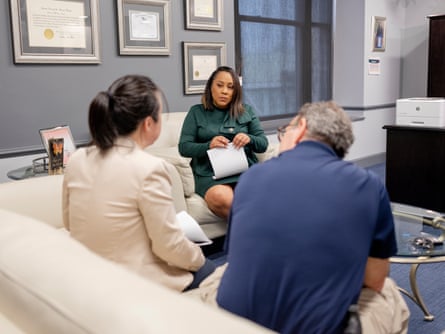The synopsis for a Fani Willis biopic would probably go something like this: In Fulton county, the first Black woman to serve as district attorney takes on an unlikely case. Willis grew up attending court with her father, a defense attorney and Black Panther. Now, she sits on the opposite side of the courtroom, hoping to indict a former president who sought to overturn election results and often espoused white supremacist rhetoric while doing so.
The film’s montage would pull from real life, depicting a determined, unflappable Willis relentlessly pouring over documents, leading her team through the long work hours and security risks that come with bringing an indictment against an often inflammatory former president, even as national attention on the case reached a groundswell.
We’d watch her face racist threats and unsubstantiated rumors of misconduct, but she’d refuse to back down from the task at hand. She’d advocate for what she believed to be right even when it wasn’t popular. She’d appear in press conferences and in media interviews delivering stern soundbites such as: “Lady justice is actually blind. This is the reality. If you come into my community and you commit a crime, you deserve to be held responsible.”
According to some of Willis’s colleagues who have worked with her over more than 20 years, all of this would be an accurate depiction of the district attorney. Defense attorney Brian Steel has known Willis her entire career and says she’s both “extremely honest” and “extremely hard working”. Atlanta NAACP president Gerald Griggs described her as “transparent”, a “zealous advocate for the state” and the “best trial attorney” in the Fulton county district attorney’s office.
“What you see on TV is authentic to who she really is,” he said.
Still, there are nuances that film has always eschewed in order to tell a more succinct story. Willis’s career, like most people’s, is full of the type of complexities that don’t always fit neatly into a box. What’s clear from speaking with several of her colleagues in Atlanta’s legal community, however, is that the district attorney’s entire career has been preparing her for this moment in the spotlight.
Willis is expected to ask a grand jury this week to indict former president Donald Trump and others for their attempts to overturn the election. The announcement of criminal charges, part of a sprawling racketeering case, will be the culmination of more than two years of work.
In early 2021, Willis had just been elected district attorney when she announced plans to investigate Trump. She took office by unseating her former boss, who had served as the DA in Georgia’s most populous county (which includes the state’s capital, Atlanta) for six terms, or 23 years.
Her investigation has focused on Trump’s efforts to subvert the will of Georgia’s voters, including his campaign’s plot to assemble a slate of fake electors and Trump’s phone call to Georgia’s Republican secretary of state, Brad Raffensperger, asking him to “find 11,780 votes”, which would make him the winner over Joe Biden in the state.
In her first term as DA – and amid ongoing conversations about criminal justice reform in Georgia and beyond – Willis has not only prepared to face off with a former president and his legal team, she’s also been tough on crime in a number of other ways, too.
Since running for office, the Democratic official has made no apologies for being a liberal with conservative-leaning views on criminal justice or the fact that she was endorsed and received funding from a police union during her campaign. As DA, she’s indicted Grammy-award winning rapper Young Thug and his music collective under Georgia’s racketeering statute, fought appeals from teachers she previously prosecuted during a high-profile standardized test cheating scandal, and sought the death penalty for a man who murdered four women during a shooting spree that targeted Asian spas in metro Atlanta.
“She’s a prosecutor through and through. She wholeheartedly believes in the work, for better or for worse, depending on which side of the lane you fall on,” said Devin Franklin, policy counsel for the Southern Center for Human Rights.
In 2020, Willis unseated the six-term Democratic incumbent Paul Howard, securing 73% of the vote, at a time of both local and national unrest. For many residents of Fulton county, her campaign not only offered a new direction for the DA’s office, which had become plagued by controversies, but it also promised to address increasing concerns about reports of a crime wave and the resignation of about 200 officers from the Atlanta police department.
“It was a strange period of time,” said Anthony Michael Kreis, a Georgia State University law professor. “I think there was just a general agitation in the community.”
An Inglewood, California, native who attended Howard University and then Emory University for law school, Willis began working in the Atlanta solicitor’s office in 2000. In that role, she handled petty crimes before working for her predecessor in the Fulton county district attorney’s office in 2001.
In Howard’s office, she was eventually tasked with prosecuting high-profile murder cases and, notably, the Atlanta public schools cheating trial. The Atlanta Journal-Constitution has referred to the case as the “largest school-cheating scandal in US history”. Eleven educators were found guilty in the racketeering case, which spanned six months of testimony to become the longest trial in Georgia history. Twenty-one people accepted plea deals. Willis served as one of three lead prosecutors throughout the trial.

Anna Simonton, an editor and reporter for the criminal justice news organization the Appeal, co-wrote the book None of the Above about the trial. (The other author, Shani Robinson, was convicted during the trial and continues to proclaim her innocence. She is currently out on an appeal bond.) Simonton said she wasn’t familiar with Willis until she began reporting on the trial.
“In reading the trial transcripts, she began to emerge to me as a distinct part in the prosecution team and someone who was very theatrical,” she said. “One of her tactics was to really pull on the emotions of the jury. I was surprised by some of the things I was seeing her say in the transcript because of how bombastic it was at the time.”
The reporter said the district attorney’s office’s use of the racketeering statute served as a “dragnet” for a large number of educators with varying to no levels of culpability.
Georgia’s Racketeer Influenced and Corrupt Organizations (Rico) Act was enacted in 1980, a decade after the federal version, which has a notably narrower scope. The federal statute, for instance, requires that prosecutors show proof that there is a threat of ongoing racketeering activity. In Georgia, only two related acts are needed to prove a pattern.
Howard was leading the Fulton county DA’s office when prosecutors used the Rico Act against the Atlanta public school educators. Still, the trial gave Willis the knowledge and confidence to use the tool more than any of her predecessors once she became district attorney. She’s since hired attorney John E Floyd, a leading Rico expert, to help with these types of cases.
Kreis said the Atlanta public schools trial gives a preview of how Willis might prosecute Trump and associates.
“You had all of these teachers who knew what they were doing was wrong,” he said. “No one would think falsifying test scores was a good thing or a proper thing, but they didn’t know exactly what other teachers or schools were working together. But they were all working towards the same impermissible end.”
“I think the 2020 election aftermath and attempts to overthrow the election are very similar to that,” he added. “There’s a lot of moving parts and a lot of different actors and they all don’t necessarily have the same degree of information as all of the others, and they all don’t get together to say ‘let’s do this unlawful thing,’ but they know that they’re a part of a machine that’s doing something that they shouldn’t.”

Some in Fulton county aren’t excited about the expansive use of the Rico Act in the past decade.
“Rico is so broad in Georgia that it really is a free-for-all,” Franklin said. “It allows for the substance of the case to become secondary and it allows for prosecutors to just tell a narrative of whatever they want to tell because the pattern of racketeering only has to be two occurrences that don’t necessarily have to be related to one another. It just felt abusive and leans into this concept of prosecutors as bullies who just want to get what they want as opposed to using the tools at their disposal to achieve community safety and justice.”
Defense attorney Steel is currently representing Young Thug, whose real name is Jeffrey Williams, in a racketeering case that is poised to unseat the educators’ trial as the longest in Georgia history. (The trial began the first week in January. A jury has yet to be selected.)
Steel maintains that Williams is “totally innocent and wrongfully charged” and “not a part of any conspiracy”.
NAACP president Griggs isn’t short on praise for Willis, but even he has been critical of her use of the statute. Specifically, Griggs was one of the defense attorneys in the Atlanta public schools cheating trial. His client was convicted, although she has since had her record expunged and sealed, and has returned to teaching. “With that particular case, I think it was a waste of time,” he said.
Still, Griggs said he credits Willis for the organization and transparency she’s brought to the district attorney’s office and warned against underestimating how likable she can be with jurors.
“I know Fani and I’m looking forward to seeing her actually try this case herself,” he said. “Especially after the former president has gone after her personally. I think he’s going to be very surprised when he’s sitting across from her for months on trial. He’ll find out how great of a lawyer she really is.”
No matter what perceptions voters have had of her until this point, Georgia State professor Kreis said Willis is likely to have a “clean slate” with her liberal base in Fulton county if she’s able to secure a conviction against Trump.

